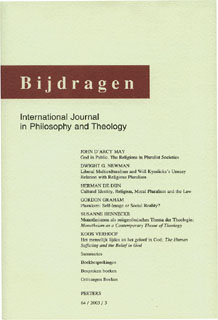next article in this issue  |

|
Document Details : Title: Justification rather than Truth Subtitle: Gotthold Ephraim Lessing's Defence of Positive Religion in the Ring-Parable Author(s): GRUBE, Dirk-Martin Journal: Bijdragen Volume: 66 Issue: 4 Date: 2005 Pages: 357-378 DOI: 10.2143/BIJ.66.4.2004375 Abstract : In chapter I, different types of interpretations of Lessing’s ring-parable are introduced. After a summary of them (section 1), the different types are sketched (section 2) and their plausibility is evaluated (section 3). I suggest preferring the interpretation according to which Lessing suggests that, although the truth of (positive) religion is (as of yet) undecided, we can nevertheless be epistemically justified to continue believing in our Christian, Jewish, Muslim ...religion (section 5). In chapter II, I defend the philosophical tenability of Lessing’s solution. He does not advocate the philosophically untenable idea that truth can be relativized (section 6). His contentions should be interpreted as not primarily targeting questions of truth proper but, rather, questions of justification. After sketching the difference between accounts of justification and of truth proper, I show in which fashion Lessing answers questions of justification (section 7). In chapter III, I show that a solution along Lessing’s lines brings fresh and promising resources to the study of the philosophy of religion. What I call the standard paradigmin the philosophy of religion, viz. the attempt to demonstrate the truth or falsity of religion, has provided inconclusive results in my judgment. And there is little hope that the decisive argument for or against religion will surface in the foreseeable future. Thus I suggest that, rather than devoting our energies to the standard paradigm, we should devote them to what I call the new paradigm. According to the latter, the question whether or not certain religious utterances are epistemically justified rather than the question whether they are true is crucial (section 8). Finally, I show in which fashion William James, Alvin Plantinga, and my own coherentist holism are all proponents of this new paradigm, thus intellectual allies of Lessing (section 9). |
